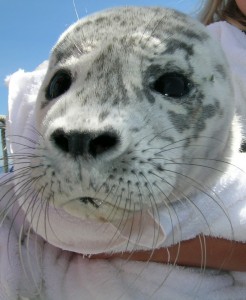from Liz Anderson and Kay Wicinas
SeaDoc Society

Picking up a stranded harbor seal is prohibited by law. If you come across a seal pup without its mother, please report it to the marine mammal stranding hotline at 1-800-562-8832.
We are officially heading into summer and the start of the harbor seal pupping season on the San Juan Islands. Once it begins, seal pups are sometimes encountered on the beach and there are some important things to remember.
The first point to keep in mind is the normal behavior of a mother seal and its pup. It is not unusual for the harbor seal mother to leave its young on the beach as she returns to the ocean to forage for the food she needs to produce enough high fat milk to support her pup. In the early stages of its life the young pup does not have the insulation or the proper swimming proficiency to keep up with its mother. It takes 3-6 weeks for the pup to triple its weight, drinking the mother’s milk that is made up of 40-50% fat, before it is weaned and able to forage on its own.
A healthy pup on the beach, waiting for its mother’s return, will be very alert, make vocalizing noises, and have a plump appearance. Please do not approach these pups. Give them their space, and keep pets, boats or any other nuisances away from them.
When a pup is actually stranded and not waiting for its mother’s return, it will appear lethargic and thin from lack of nutrition. These stranded pups have often been separated from their mothers prior to being weaned. This separation can occur in a number of ways including: inexperience of a first time mother, boat activity, human interference/disturbance, injury or illness. Unfortunately many of these pups will not survive; however, this is Mother Nature’s way of keeping the population in check and maintaining the healthiest animals possible.
Harbor seals are protected under the Marine Mammal Protection Act. Picking up a stranded harbor seal is prohibited by law. If you come across a seal pup without its mother, please report it to the marine mammal stranding hotline at 1-800-562-8832.
The San Juan County Marine Mammal Stranding Network is a program with the Friday Harbor Whale Museum and has trained volunteers authorized to respond to marine mammal strandings within the county of San Juan. Last year alone, the stranding network received over 110 calls concerning harbor seals and over 140 total stranded marine mammal calls. Data collected on stranded harbor seals can teach us a lot about the health and status of seal populations and provides us with valuable information about diseases that can impact not only harbor seals, but also sea lions, porpoises, orcas and even humans. Under certain circumstances, the Stranding Network is authorized to transfer stranded harbor seal pups to Wolf Hollow Wildlife Rehabilitation Center, where they are rehabilitated and released. Network representatives will make this decision on a case-by-case basis.
The SeaDoc Society of Orcas Island also conducts research on these animals in collaboration with the Stranding Network. When an animal is reported on the stranding hotline, interns and volunteers respond to assess the situation. Live pups receive two tags, one small red tag with an identification number on their hind flipper, and one “hat” tag with a letter/number combination ID on top of their head. If you see an animal (live or dead, stranded or swimming) that has any of these tags and you can read them, please jot down the number and include it in your message to the stranding network hotline at 1-800-562-8832.
Harbor seals are charismatic mammals, but please give them plenty of space as you appreciate them and other marine wildlife. Be mindful that these animals can carry diseases that can be passed to humans or pets. If you encounter a live or deceased harbor seal pup or stranded marine mammal, please do not approach it. You can help by calling the stranding hotline to report it at 1-800-562-8832.
About the Authors:
Kay Wicinas and Liz Anderson are 3rd year veterinary students at the UC Davis School of Veterinary Medicine. They are summer interns with The Whale Museum and SeaDoc Society studying marine mammal health and ecology.
**If you are reading theOrcasonian for free, thank your fellow islanders. If you would like to support theOrcasonian CLICK HERE to set your modestly-priced, voluntary subscription. Otherwise, no worries; we’re happy to share with you.**








As a founding member of Seal Watch in Jenner, CA, where there was a seal colony, I applaud your work. At that time, federal law required the public to stay at least 50 yards from the seals. Since you ask people here to approach any lone seal pup with a red ear tag and report the tag’s number, is there a legal exception for this kind of approach?